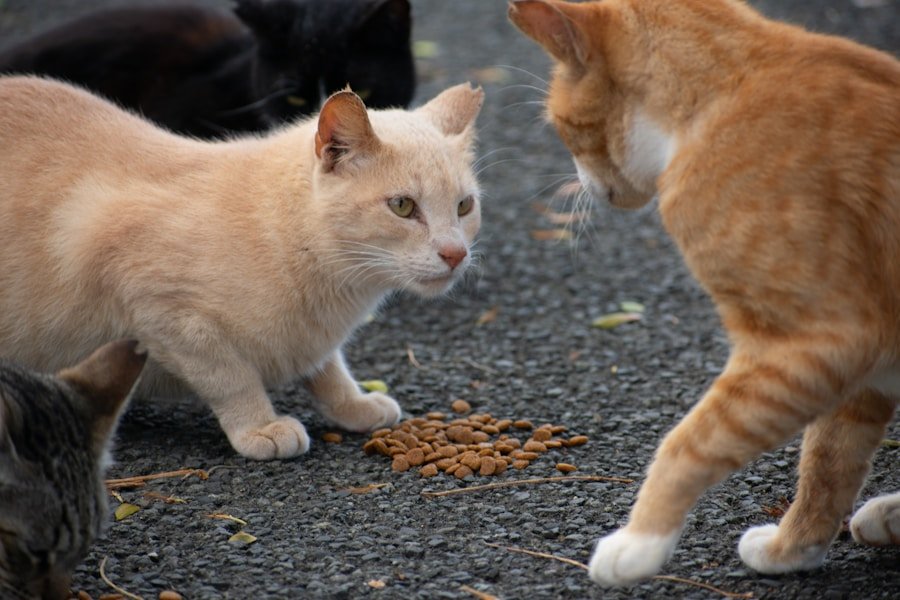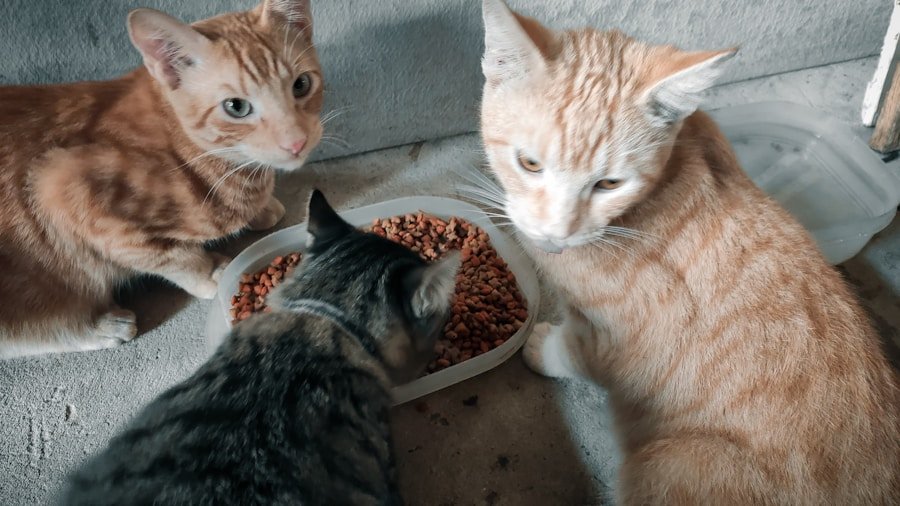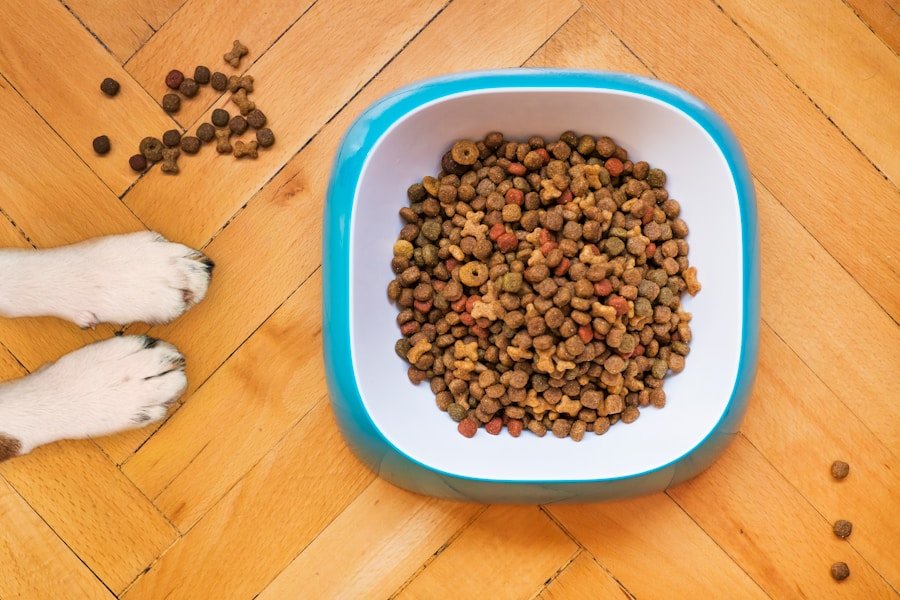Table of Contents
Feline nutrition is a critical aspect of cat ownership that often goes overlooked. Understanding what constitutes a balanced diet for cats is essential for their overall health and well-being. Cats are obligate carnivores, meaning their bodies are designed to thrive on a diet primarily composed of animal-based proteins.
This unique dietary requirement sets them apart from many other pets, including dogs, which are omnivores and can derive nutrients from both animal and plant sources. As such, the nutritional needs of cats are specific and must be met to ensure they lead healthy, active lives.
A well-balanced diet not only supports a cat’s physical health but also influences their behavior, energy levels, and longevity. With the plethora of cat food options available on the market today, it can be overwhelming for pet owners to determine what is best for their feline companions. This article aims to shed light on the nutritional needs of kittens, the differences between cat and dog food, the risks associated with improper feeding, and how to make informed choices about kitten nutrition.
Key Takeaways
- Feline nutrition is essential for the overall health and well-being of cats.
- Kittens have specific nutritional needs that differ from adult cats and should be met with a balanced diet.
- Cat and dog food are formulated differently to meet the specific nutritional requirements of each species.
- Feeding kittens dog food can lead to nutritional deficiencies and health problems.
- When choosing kitten food, look for options that are specifically formulated for kittens and consult a veterinarian for advice.
Understanding the Nutritional Needs of Kittens
Protein for Muscle Development
A kitten’s diet should be high in animal protein to support muscle development and overall growth.
Fat for Energy Needs
Additionally, they require higher levels of fat compared to adult cats, as fat serves as a concentrated source of energy that fuels their playful antics and exploratory behavior.
Essential Vitamins and Minerals
In addition to protein and fat, kittens need specific vitamins and minerals to support their developing bodies. For instance, calcium and phosphorus are crucial for healthy bone growth, while taurine—a vital amino acid—plays a significant role in heart health and vision. A well-formulated kitten food will contain these essential nutrients in appropriate ratios to ensure optimal growth and development. It is important for pet owners to choose foods specifically labeled for kittens, as these formulations are designed to meet their unique needs during this critical stage of life.
Differences Between Cat and Dog Food

One of the most common misconceptions among pet owners is that cat food and dog food can be used interchangeably. While both types of food may appear similar at first glance, they are formulated to meet the distinct dietary needs of each species. Cats require higher levels of protein and certain nutrients that dogs do not need in the same quantities.
Potential Risks of Feeding Kittens Dog Food
| Potential Risks | Description |
|---|---|
| Nutritional Imbalance | Dog food may not contain the necessary nutrients required for a kitten’s growth and development. |
| Excess Protein | Dog food often contains higher levels of protein which can be harmful to kittens’ kidneys. |
| Taurine Deficiency | Kittens require taurine in their diet, which may be lacking in dog food. |
| Developmental Issues | Feeding kittens dog food can lead to stunted growth and other developmental problems. |
Feeding kittens dog food can pose several risks that may compromise their health and development. One of the most significant concerns is the lack of essential nutrients found in cat food that are vital for kittens’ growth. For instance, dog food typically contains lower levels of protein and fat than what kittens require during their formative months.
This deficiency can lead to stunted growth, poor muscle development, and overall lethargy. Additionally, long-term consumption of dog food can result in serious health issues due to nutrient imbalances. Kittens fed dog food may experience deficiencies in taurine, which can lead to heart problems such as dilated cardiomyopathy or vision issues like retinal degeneration.
Furthermore, the absence of certain vitamins and minerals can weaken their immune system, making them more susceptible to infections and diseases. It is crucial for pet owners to recognize these risks and ensure that their kittens receive a diet specifically formulated for their needs.
Tips for Choosing the Right Kitten Food
Selecting the right kitten food can be a daunting task given the vast array of options available on the market. To make an informed choice, pet owners should look for products specifically labeled as “kitten food,” as these formulations are designed to meet the unique nutritional requirements of growing cats. Reading ingredient labels is also essential; high-quality kitten food should list a source of animal protein as the first ingredient, such as chicken or fish.
In addition to protein content, pet owners should consider the fat content in kitten food. A good kitten diet should contain around 20-30% fat to provide adequate energy for growth and playfulness. Furthermore, it is advisable to choose foods that include essential vitamins and minerals like calcium, phosphorus, and taurine.
Consulting with a veterinarian can also provide valuable insights into selecting the best food based on a kitten’s specific needs and any potential health concerns.
Transitioning Kittens to Adult Cat Food

Gradual Introduction of Adult Food
To avoid gastrointestinal upset, it’s crucial to introduce adult cat food gradually. This can be done by mixing small amounts of adult food with the kitten food over several days until the transition is complete.
Monitoring for Digestive Issues
During this transition period, pet owners should keep an eye out for any signs of digestive issues or changes in appetite. It’s vital to choose high-quality adult cat food that meets the nutritional needs of adult cats while taking into account any specific requirements or dietary restrictions.
Ensuring a Smooth Transition
The goal is to ensure that the cat continues to receive balanced nutrition as they move into this new stage of life. By following these steps, pet owners can help their cats transition smoothly to adult cat food and maintain optimal health.
Consulting a Veterinarian for Feeding Advice
When it comes to feline nutrition, consulting a veterinarian is one of the best steps pet owners can take to ensure their cats receive optimal care. Veterinarians possess extensive knowledge about feline dietary needs and can provide personalized recommendations based on a cat’s age, weight, activity level, and any underlying health conditions. They can also help identify any potential allergies or sensitivities that may affect a cat’s diet.
Regular veterinary check-ups are essential not only for monitoring a cat’s overall health but also for discussing dietary changes as they age. A veterinarian can guide pet owners through the process of selecting appropriate foods at different life stages and help address any concerns regarding feeding practices or nutritional deficiencies. By prioritizing veterinary advice in matters of nutrition, pet owners can significantly enhance their cats’ quality of life.
Prioritizing Feline Nutrition
In conclusion, understanding feline nutrition is paramount for ensuring that cats lead healthy and fulfilling lives. From recognizing the unique dietary needs of kittens to making informed choices about transitioning them to adult cat food, every aspect plays a vital role in their overall well-being. The differences between cat and dog food highlight the importance of providing species-appropriate nutrition tailored specifically for felines.
By being aware of the potential risks associated with improper feeding practices and seeking guidance from veterinarians when needed, pet owners can make educated decisions about their cats’ diets. Ultimately, prioritizing feline nutrition not only supports physical health but also contributes to happier, more vibrant lives for our beloved feline companions. As responsible pet owners, it is our duty to ensure that our cats receive the best possible nutrition throughout their lives.
If you’re wondering whether kittens can eat dog food, you may want to check out this article on


